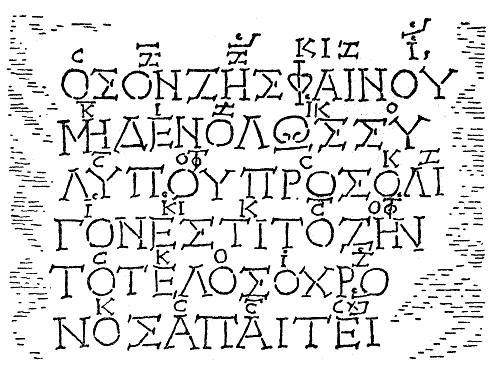Well, my proposal for a new weekly feature here met with some measure of approval, so here we go with the First Entry. Before I do so, I wanna give some credit for the inspiration for this series to ZurichMike (the other ZM of the Treehouse)– on Thursday’s language post, he and I had a brief conversation around the pronunciation of the word “forte”, which had me quoting some lines from the aria “Nessun Dorma” (From Puccini’s Turandot). This made we want to post the aria for all to enjoy, but then the wheels started turning, and what would have been one post will be a recurring series.
 But I’m going to hold off on the Puccini. If we’re to do this properly, and considering that we are the Conservative Treehouse. . . we must start much as we started the Advent Calendar, and kick it old school. Only today, we’re leaving Chant in the dust, going back another thousand years, for the oldest recorded complete song on the planet.
But I’m going to hold off on the Puccini. If we’re to do this properly, and considering that we are the Conservative Treehouse. . . we must start much as we started the Advent Calendar, and kick it old school. Only today, we’re leaving Chant in the dust, going back another thousand years, for the oldest recorded complete song on the planet.
There are actually fragments of songs with musical notation going back to the Babylonians of 2000 BC, written in cuneiform. And there are other songs from China that are very plausibly dating from 1,000 BC. But those songs were not written down until the Tang Dynasty (618-907 AD). [Oddly enough, it seems that the idea of recording music was something Western Civilization has been doing for at least 4,000 years, while no one else had the idea until Tang Dynasty China. . . and even then, it’s still a mostly Western phenomenon, which is why music history and theory courses focus on Western Music– because that’s what got recorded for posterity.]
Thus is it that the oldest complete record of a song is the “Epitaph of Seikilos.” This song was carved into a tombstone, found in 1883 AD near Aiden, Turkey (which is not far from Ephesus). The words written upon the tombstone translate as follows:
“I am a tombstone, an image. Seikilos placed me here as an everlasting sign of deathless remembrance.”
Then follow the text of the song:
“While you live, shine.
Do not let yourself become overburdened by grief
For life exists only for a short time
And time demands its toll.”
Followed by the dedication:
“(from) Seikilos to Euterpe”
This dedication has led many scholars to conclude that Euterpe is the name of Seikilos’ (presumably dead) wife. Funnily enough, she shared her name with the Muse of Music and Lyric Poetry.
Of all songs written so long ago, I find it oddly appropriate that this should be the oldest complete song in the West. It is so familiar in sound and sentiment–it’s a song of a man, grieving a love taken from him by time, but still treasuring his memories of her. It’s not some song praising one’s duty to a god or country, nor an epic of battles, nor a philisophical aria. It’s a heartbroken love song: simple, sad, and poignant in it’s elegance. The melody is evocative of his sorrow, the words filled with both inspiration and grief. This version progressively takes some liberties, but I like it anyway . . .
I was surprised when I went looking for this, that the makers of the videogame Civilization have included it in their soundtrack for Civilization V. I admit to being a bit skeptical at first, but I actually enjoyed this orchestration– it’s a respectful and stirring tribute to the musical roots of Western Civilization.
I do hope you enjoyed today’s selection!